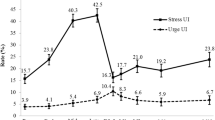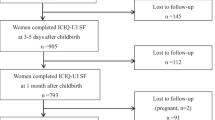Abstract
One hundred ninety four women with a Body Mass Index (BMI) of at least 30 kg/m2 who were delivered vaginally between 01 10 93 and 30 09 95 at the obstetric department, Herning Central Hospital, were sent a postal questionnaire about stress incontinence. The response rate was 89.2%. In the heavy birth weight group (n=4000 g or more) stress incontinence increased from 10.6% before pregnancy to 34.0% post partum. In the low birth weight group 6.9% suffered from stressincontinence before pregnancy increasing to 30.6% post partum. There was no difference in the reporting of mixed or urge incontinence between the two groups.
Similar content being viewed by others
References
Beck RP, Hsu M (1965) Pregnancy, childbirth, and the menopause related to the development of stress incontinence. Am J Obstet Gynecol 91:820–823
Burgio KL, Matthews KA, Engel BT (1991) Prevalence, incidence and correlates of urinary incontinence in healthy, middle-aged women. J Urol 146:1255–1259
Foldspang A, Mommsen S, Lam GW, et al. (1992) Parity as a correlate of adult female urinary incontinence prevalence. J Epidemiol Community Health 46:595–600
Foldspang A, Mommsen S (1995) Overvægt og ufrivillig vandladning hos kvinder. Ugeskr Læger 157:5848–5851
Iosif F (1981) Stress incontinence during pregnancy and in puerperium. Int J Gynaecol Obstet 19:13–20
Mattox TF, Bhatia NN (1996) The prevalence of urinary incontinence or prolapse among white and Hispanic women. Am J Obstet Gynecol 174:646–648
Rasmussen KL, Krue S, Johansson LE, Agger AO (1996) Obesity as apredictor of postpartum urinary symptoms. Acta Obstet Gynecol Scand in press
Skoner MM, Thompsen WD, Caron VA (1994) Factors associated with risk of stress urinary incontinence in women. Nurs Res 43:301–306
Thind P, Loose G (1994) The effect of bilateral pudendal blockade on the adjunctive urethral closure forces in healthy females. Scand J Urol Nephrol 28:249–255
Viktrup L, Loose G, Rolf M, Barfoed K (1993) The frequency of urinary symptoms during pregnancy and puerperium in the primapara. Int Urogynecol J 4:27–30
Wilson PD, Herbison RM, Herbison GP (1996) Obstetric practice and the prevalence of urinary incontinence three months after delivery. Br J Obstet Gynecol 103:154–161
Author information
Authors and Affiliations
Rights and permissions
About this article
Cite this article
Krue, S., Jensen, H., Agger, A.O. et al. The influence of infant birth weight on post partum stress incontinence in obese women. Arch Gynecol Obstet 259, 143–145 (1997). https://doi.org/10.1007/BF02505323
Received:
Accepted:
Issue Date:
DOI: https://doi.org/10.1007/BF02505323




